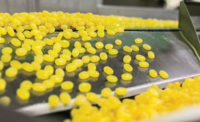Medicated confections: Helping the medicine go down
Functional benefts universe has expanded for medications, but taste still plays a role.

The functional benefits universe has greatly expanded for medicated confections. Taste, however, still plays a role in helping the medicine go down.


Dr. John's Thrive and Thrive+ lollipops are sugar-free and made with natural colors and flavors. They're also made with fiber and probiotics for additional digestive benefits.

In addition to its Halls menthol and filled-center throat drops, Mondelez International offers the Defense line of dietary supplement drops with 106 milligrams of Vitamin C in each two drop serving.

Vicks introduced TripleAction sugar-free cough drops.





In a way, the term “medicated confections” sounds like an oxymoron.
Medicated products are often associated with astringent cough suppressants and powerful menthol, not to mention the imagery of feeling ill. Candy, meanwhile, represents everything that is fun and sweet.
Can the two join forces in a way that is healthy and happy, useful and tasty? Absolutely, say John and Debra Bruinsma, founders of Dr. John’s sugar-free lollipops and hard candies.
As a dentist and dental hygienist, respectively, the couple sought to offer options to patients wanting to enjoy candy without damaging their teeth. They soon found lollipops are also an ideal vehicle for supplements and other beneficial ingredients.
“As opposed to other ways people might receive the medication or the functional ingredients, in a confection, it’s enjoyable; it’s fun,” John said. “It’s appealing, and I think for the most part, it probably tastes better.”
Consumers would agree. The global medicated confectionery market reached $5.13 billion in 2016, and it’s projected to grow by 3.29 percent through 2021, says London-based market research firm Technavio. Increasing incidences of allergies and hay fever, as well as greater air pollution, have consumers turning to lozenges, pastilles and other hard-boiled confectionery items for relief from coughing and sore throats.
In addition to environmental factors, innovation in the medicated confectionery space continues to draw in consumers, says a report released last month by Pune, India-based firm Market Research Future.
“Growing demand for the product is supported by the new developments and continuous innovations by the key players,” the executive summary reads. “High focus on packaging and marketing of the product is playing a major role in attracting the consumers and expanding the market of medicated confectionery.”
Part of that marketing appeal comes from using organic, natural and herbal ingredients, which consumers increasingly seek across all confectionery categories.
Lollipops with Dr. John’s Thrive and Thrive+ formulations fit the bill, Debra says. In addition to being made with natural colors and flavors, they’re made with xylitol and erythritol, sweeteners that are said to fight tooth decay.
But by working with organizations like the MaxLove Project — an initiative promoting whole-body wellness for children being treated for cancer — the Bruinsmas wanted to take it a step further. Each Thrive lollipop has 5 grams of fiber, while each Thrive+ lollipop has fiber — a prebiotic — plus one billion colony forming units (CFU) of probiotics.
Dr. John’s uses GanedenBC30, a patented strain of bacteria that waits to germinate until it reaches a consumer’s intestines, allowing it to survive the high heat of the sugar candy manufacturing process and the consumer to reap more of the digestive benefits.
While it works for any candy lover, Debra noted young cancer patients experience less nausea and struggle less with sores and foul tastes in their mouths resulting from chemotherapy when they eat Thrive and Thrive+ pops.
“This lollipop is just a bright spot in their day going through some not-so-pleasant treatment,” she said.
Debra also noted the Thrive and Thrive+ pops help parents ensure their children get the fiber they need in a way they’ll enjoy.
“Children just don’t seem to getting enough fiber in their diet, so the pediatricians are advising parents to find fiber drinks, fiber supplements,” she said. “That’s probably not going to work for a younger child. Here we have this lollipop that is going to keep their systems moving, so to speak.”
For consumers with scratchy throats and a persistent cough, throat lozenges and drops also offer a bit of reprieve — and perhaps help build up consumers’ defenses.
At ISM in January, Katjes Fassin GmbH, licenser of Proctor & Gamble’s Vicks products in Europe, introduced TripleAction sugar-free cough drops. They have a liquid center with menthol for coughing and sore throat relief, as well as zinc and Vitamin C to help support normal immune system function.
In addition to its Halls menthol and filled-center throat drops, Mondelez International offers the Defense line of dietary supplement drops with 106 milligrams of Vitamin C in each two-drop serving. They’re available in Citrus, Strawberry and Watermelon flavors.
Ricola, meanwhile, builds on its reputation of natural, herbal products with its line of Herbal Immunity drops and gummies. Along with Ricola’s special herb blend, they’re formulated with ginseng and Vitamins C, B6 and B12, which can help fight fatigue and boost immune system function. The gummies are citrus flavored, and the drops are available in Citrus and Honey flavors.
Whether the drops and lollipops are meant to soothe throats or support the body’s various systems, there’s one thing that must hold true — they have to taste good.
“Sometimes medicinal has a bad connotation for taste or it might have an aftertaste,” Debra said. “In the end, if they don’t have a good taste, the kids aren’t going to comply either.”
Looking for a reprint of this article?
From high-res PDFs to custom plaques, order your copy today!










